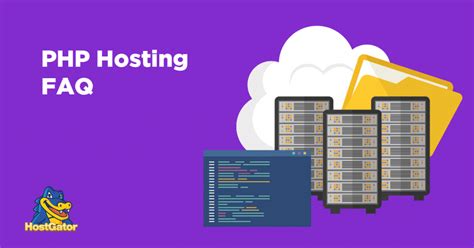Php Hosting: The Ultimate Guide to Fast and Reliable Web Hosting

What is PHP Hosting?
PHP hosting refers to the hosting of websites that are developed using PHP (Hypertext Preprocessor) programming language. PHP is one of the most popular scripting languages used for web development. It is an open-source language that allows developers to create dynamic and interactive websites. In order to run PHP scripts and manage PHP-based websites, you need a web hosting provider that supports PHP.
PHP hosting provides a platform for hosting PHP-based websites with specific features and configurations that are optimized for PHP. These hosting plans include support for PHP modules, databases, and other tools required for running PHP applications smoothly.
Why Choose PHP Hosting?
If you are building a website using PHP, choosing a PHP hosting provider offers several advantages:
- Compatibility: PHP hosting is designed to work seamlessly with PHP-based websites. The server configurations and tools provided by PHP hosting providers are specifically tailored to meet the requirements of PHP applications.
- Performance: PHP hosting typically includes caching mechanisms and optimizations that enhance the performance of PHP websites. These optimizations ensure that your website loads quickly and delivers a smooth user experience.
- Security: PHP hosting providers implement security measures to protect PHP websites from common vulnerabilities and attacks. They often include features like SSL certificates, firewalls, and regular security updates to keep your website secure.
- Scalability: PHP hosting offers scalability options, allowing you to easily scale your website as your traffic and resource needs grow. Most PHP hosting providers offer flexible plans and resources that can be upgraded as your website expands.
- Support: PHP hosting providers offer specialized support for PHP-related issues and troubleshooting. Their web hosting experts are well-versed in PHP and can provide assistance in case you encounter any problems with your PHP-based website.
Types of PHP Hosting
When it comes to PHP hosting, there are several types of hosting plans available. Let’s take a closer look at each of these options:
1. Shared Hosting
Shared hosting is the most affordable and popular type of hosting for PHP websites. In shared hosting, multiple websites share the same server resources. This means that the performance of your website can be affected by other websites hosted on the same server. However, shared hosting is suitable for small websites or beginners with limited traffic and resource requirements.
Shared hosting providers typically offer PHP support and a user-friendly control panel for managing your website. They handle the server maintenance and security, allowing you to focus on building and managing your website.
2. Virtual Private Server (VPS) Hosting
VPS hosting provides more control and resources compared to shared hosting. In VPS hosting, a physical server is divided into multiple virtual servers, each running its own operating system and hosting environment. This ensures better performance and stability for your PHP website.
With VPS hosting, you have more control over the server configuration and can customize it according to your requirements. This type of hosting is suitable for websites that require more resources and have moderate to high traffic.
3. Dedicated Server Hosting
Dedicated server hosting offers maximum control and resources for your PHP website. With dedicated hosting, you get an entire server dedicated solely to your website. This means that you have full control over the server configuration, allowing you to optimize it for PHP performance.
Dedicated hosting is ideal for large websites with high traffic volumes or websites that require custom configurations. However, dedicated hosting is more expensive compared to shared hosting and VPS hosting.
4. Cloud Hosting
Cloud hosting provides a flexible and scalable hosting solution for PHP websites. In cloud hosting, your website is hosted on a network of interconnected servers, rather than a single physical server. This ensures high reliability and availability for your website.
Cloud hosting allows you to easily scale your resources as your website grows. It offers a pay-as-you-go pricing model, where you only pay for the resources you actually use. This makes cloud hosting a cost-effective option for websites with unpredictable traffic.
5. Managed WordPress Hosting
If your PHP website is built on the WordPress platform, you may consider managed WordPress hosting. Managed WordPress hosting is specifically optimized for hosting WordPress websites, including PHP-based WordPress themes and plugins.
Managed WordPress hosting providers offer automatic updates, security enhancements, and specialized support for WordPress-related issues. This type of hosting is suitable for WordPress users who want a hassle-free hosting experience.
Choosing the Right PHP Hosting Provider
When it comes to choosing a PHP hosting provider, there are several factors to consider. Here are some key factors to keep in mind:
1. PHP Version and Compatibility
Make sure the hosting provider supports the PHP version required by your website. It’s also important to ensure that they regularly update their PHP versions to the latest stable releases and provide support for popular PHP frameworks and libraries.
2. Server Performance and Uptime
Check the hosting provider’s server performance and uptime statistics. A reliable PHP hosting provider should offer high server uptime and fast loading times for your website. Look for providers that have robust infrastructure and use caching mechanisms to optimize PHP performance.
3. Security Features
Security is crucial for any website. Ensure that the PHP hosting provider offers essential security features such as SSL certificates, secure FTP access, firewalls, and regular backups. They should also have a proactive approach to security and provide regular security updates.
4. Scalability Options
If you anticipate your website to grow in terms of traffic or resource needs, choose a PHP hosting provider that offers easy scalability options. The provider should allow you to easily upgrade your plan or add resources as your website expands.
5. Support Quality and Responsiveness
Consider the quality and responsiveness of the hosting provider’s customer support. They should have knowledgeable support staff who can assist you with any PHP-related issues or website optimizations. Look for providers that offer multiple support channels, such as live chat, phone, and email support.
Frequently Asked Questions (FAQs)
1. Can I host a non-PHP website on PHP hosting?
Yes, you can host non-PHP websites on PHP hosting. PHP hosting providers usually support multiple programming languages and technologies, allowing you to host websites built with different frameworks or CMS platforms.
2. What is the difference between PHP and other scripting languages?
PHP is a server-side scripting language that is specifically designed for web development. It is known for its simplicity, flexibility, and extensive community support. Compared to other scripting languages like JavaScript or Python, PHP is more focused on web application development.
3. How do I install PHP on my hosting server?
Most PHP hosting providers offer a user-friendly control panel where you can easily install and manage PHP. Additionally, PHP comes pre-installed with many popular hosting platforms. If you require a specific PHP version or configuration, you may need to consult your hosting provider’s documentation or seek their support for assistance.
4. Can I migrate my existing website to PHP hosting?
Yes, you can migrate an existing website to PHP hosting. Most hosting providers offer migration services or provide step-by-step guides to help you transfer your website files, databases, and configurations to their servers. It’s recommended to backup your website before initiating the migration process.
5. Can I use PHP with a content management system (CMS) like WordPress?
Yes, PHP is the backbone of many popular content management systems like WordPress, Drupal, and Joomla. It powers the dynamic functionality and theme templates of these CMS platforms. PHP hosting is well-suited for hosting PHP-based CMS websites as they provide the necessary server configurations and resources.
6. Is PHP hosting suitable for e-commerce websites?
Yes, PHP hosting is suitable for e-commerce websites. PHP supports many popular e-commerce platforms like Magento, WooCommerce, and PrestaShop. PHP hosting providers also offer features such as SSL certificates, secure payment gateways, and enhanced security measures to ensure the smooth and secure operation of e-commerce websites.
Conclusion
PHP hosting provides the perfect environment for hosting your PHP-based website. With compatibility, performance, security, scalability, and specialized support, PHP hosting offers all the essential features to ensure a fast and reliable web hosting experience.
When choosing a PHP hosting provider, consider factors such as PHP version compatibility, server performance, security features, scalability options, and support quality. By making an informed decision, you can ensure that your website runs smoothly and efficiently, providing an excellent user experience for your visitors.
So, embark on your PHP hosting journey and take your website to new heights of success!









